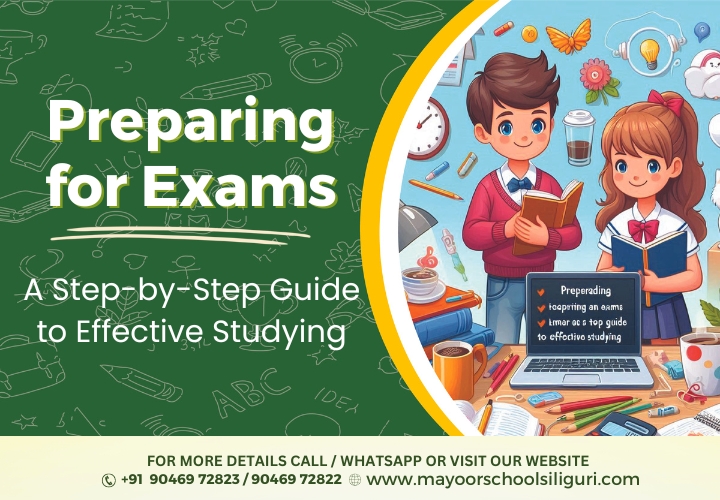
Exams are an inevitable part of academic life.
They can be a source of stress, but proper preparation can transform them into
opportunities for success. Mastering the art of studying or how
to study for exams is crucial. This step-by-step guide will help you know How
to Prepare for.
Before diving into your study materials, take
a moment to set clear, achievable goals. What do you want to accomplish in each
study session? Do you aim to understand a particular concept, memorize key
facts, or complete a set of practice problems? Defining the study
tips for students will keep you focused and motivated.
Large goals can be overwhelming therefore break them down into smaller,
manageable tasks. Instead of aiming to "study for science," break it
down into "review Chapter 5 notes," "complete practice
questions," and "memorize key terms." It is one of the best exam
preparation tips for students.
Procrastination is the enemy of effective
studying. One of the most efficient study methods
is to create a study schedule well in advance of
your exam dates. Use a planner or digital calendar to allocate specific times
for each subject. Consistency is key, so try to stick to your schedule as
closely as possible.
You must ensure that you balance your study
time across different subjects. Give more time to subjects you find
challenging, but don’t neglect the ones you’re confident in. A well-rounded
study schedule is one of the best study tips for
students at home and prevents last-minute
cramming.
Choose a study space free from distractions. A quiet room, library, or
study nook at home can provide a conducive environment for concentration.
Ensure that your study area is well-lit and comfortable.
Keep all your study materials within reach. This includes textbooks,
notebooks, pens, highlighters, and any digital devices you might need. Having
everything organized prevents wasted time searching for items and improves exam
performance.
The students must engage in active learning
by summarizing information in own words, teaching concepts to someone else, or
discussing topics with classmates. These are some study
strategies for exams. Active learning helps reinforce your understanding and retention of the
material.
Mnemonics are memory aids that help you recall information. Acronyms,
rhymes, or visual imagery can make remembering complex concepts easier. For
instance, to remember the order of the planets, you might use the acronym
"My Very Educated Mother Just Served Us Noodles."
Studying for long periods without breaks can
lead to burnout. Follow the Pomodoro Technique: study for 25 minutes, then take
a 5-minute break. After four cycles, take a longer break of 15-30 minutes.
Breaks help refresh your mind and maintain productivity. It is one of the tried
and tested efficient study methods.
Physical and mental well-being are crucial during exam preparation.
Ensure you get enough sleep, eat healthy meals, and exercise regularly.
Activities like meditation or yoga can help reduce stress and improve focus.
There is a question how
to improve exam performance? Well, you can regularly review your
notes and study materials to reinforce your memory. Brief, consistent reviews
are more effective than cramming all at once. Use flashcards or summary sheets
for quick revision sessions.
Periodically reflect on your study progress. Are you meeting your goals?
Do you need to adjust your study techniques or schedule? Reflecting helps you
stay on track and make necessary improvements.
A positive mindset can greatly impact your exam performance. You have to
believe in your ability to succeed and stay motivated. Avoid negative self-talk
and remind yourself of your progress and strengths.
Don’t hesitate to seek help if you’re struggling with a particular subject. Reach out to teachers, classmates, or tutors for clarification and support. Following study groups can also provide motivation and different perspectives on the material.
Effective exam preparation is a blend of planning, organization, and
active learning. By setting clear goals, creating a structured study schedule,
and employing effective study techniques, you can approach your exams with
confidence. Remember to take care of your physical and mental well-being,
review your progress, and maintain a positive attitude. With these strategies,
you’ll be well-equipped to achieve your academic goals and excel in your exams.
Happy studying!
Read More Article: Unlocking Future Success: How Schooling Shapes Students' Career Paths